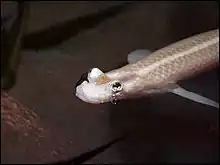Anablepidae
Anablepidae is a family of fishes which live in brackish and freshwater habitats from southern Mexico to southern South America.[2] There are three genera with sixteen species: the four-eyed fishes (genus Anableps), the onesided livebearers (genus Jenynsia) and the white-eye, Oxyzygonectes dovii. Fish of this family eat mostly insects and other invertebrates.
| Anablepidae | |
|---|---|
 | |
| Four-eyed fish, Anableps sp. | |
| Scientific classification | |
| Domain: | Eukaryota |
| Kingdom: | Animalia |
| Phylum: | Chordata |
| Class: | Actinopterygii |
| Order: | Cyprinodontiformes |
| Superfamily: | Poecilioidea |
| Family: | Anablepidae Bonaparte, 1831[1] |
| Subfamilies | |
|
See text | |
Reproduction
Fish in the subfamily Oxyzygonectinae are ovoviviparous. The Anablepinae are livebearers. They mate on one side only, right-"handed" males with left-"handed" females and vice versa.[3] The male has specialized anal rays which are greatly elongated and fused into a tube called a gonopodium associated with the sperm duct which he uses as an intromittent organ to deliver sperm to the female.
References
- Froese, Rainer, and Daniel Pauly, eds. (2012). "Anablepidae" in FishBase. August 2012 version.
- Richard van der Laan; William N. Eschmeyer & Ronald Fricke (2014). "Family-group names of Recent fishes". Zootaxa. 3882 (2): 001–230. doi:10.11646/zootaxa.3882.1.1. PMID 25543675.
- Nelson, Joseph, S. (2006). Fishes of the World. John Wiley & Sons, Inc. ISBN 0-471-25031-7.
{{cite book}}: CS1 maint: multiple names: authors list (link) - "Four Eyes and More, the Family Anablepidae". WetWebMedia.com. Retrieved 2007-03-30.
- J. S. Nelson; T. C. Grande; M. V. H. Wilson (2016). Fishes of the World (5th ed.). Wiley. p. 371. ISBN 978-1-118-34233-6. Archived from the original on 2019-04-08. Retrieved 2019-10-22.
- Eschmeyer, William N.; Fricke, Ron & van der Laan, Richard (eds.). "Genera in the family Anablepidae". Catalog of Fishes. California Academy of Sciences. Retrieved 22 October 2019.
Other References
- Berra, Tim M. (2001). Freshwater Fish Distribution. San Diego: Academic Press. ISBN 0-12-093156-7